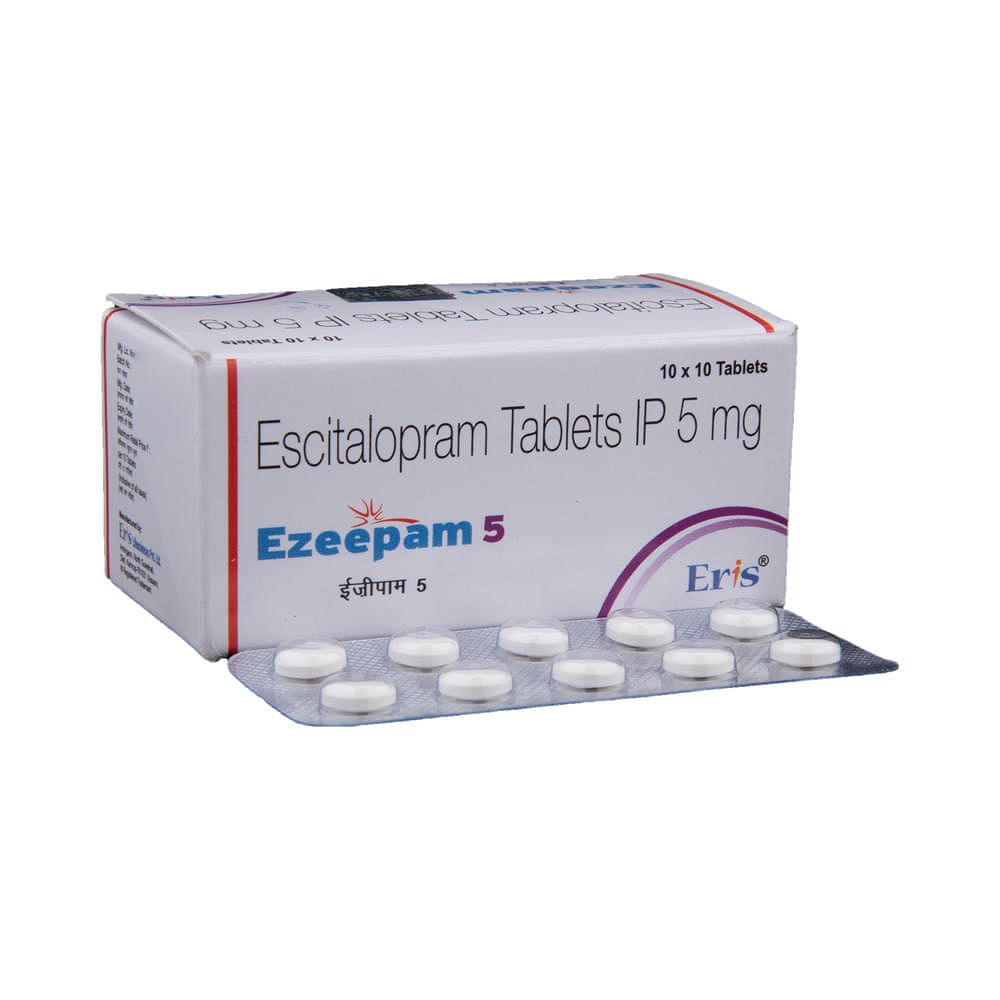
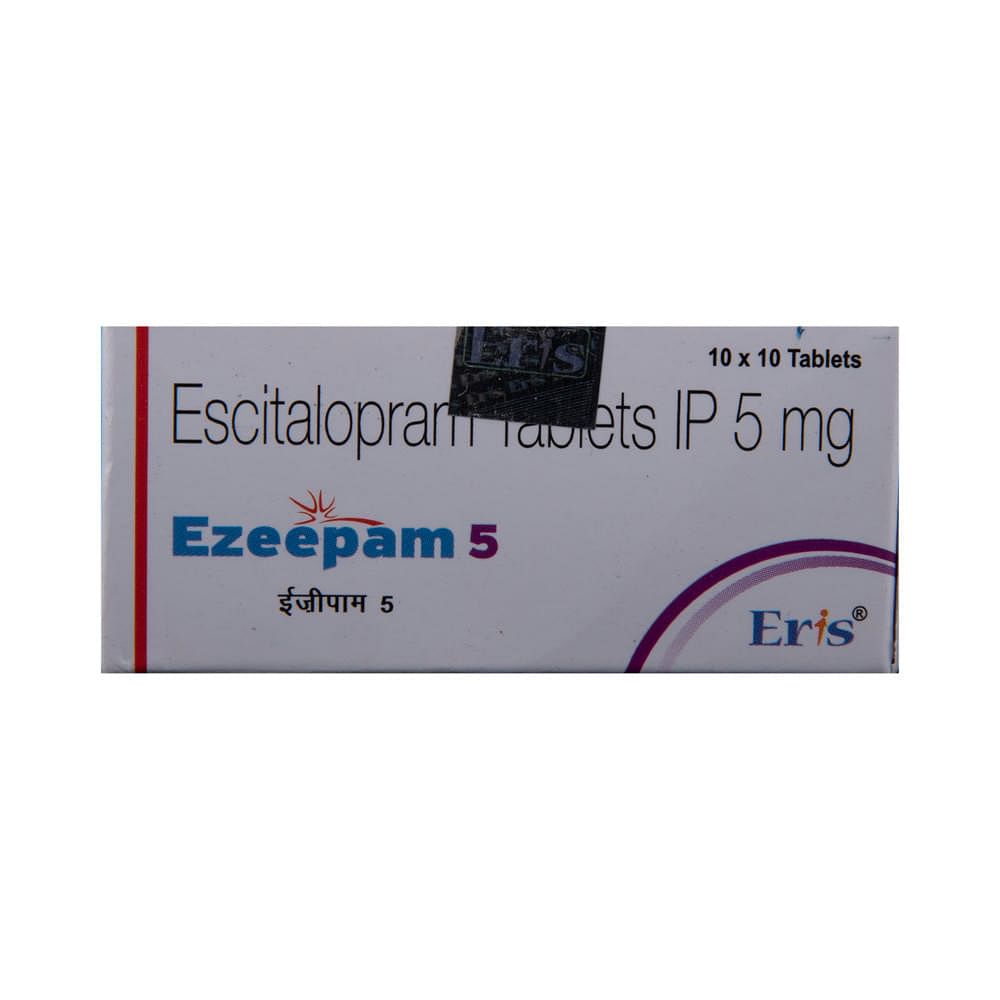
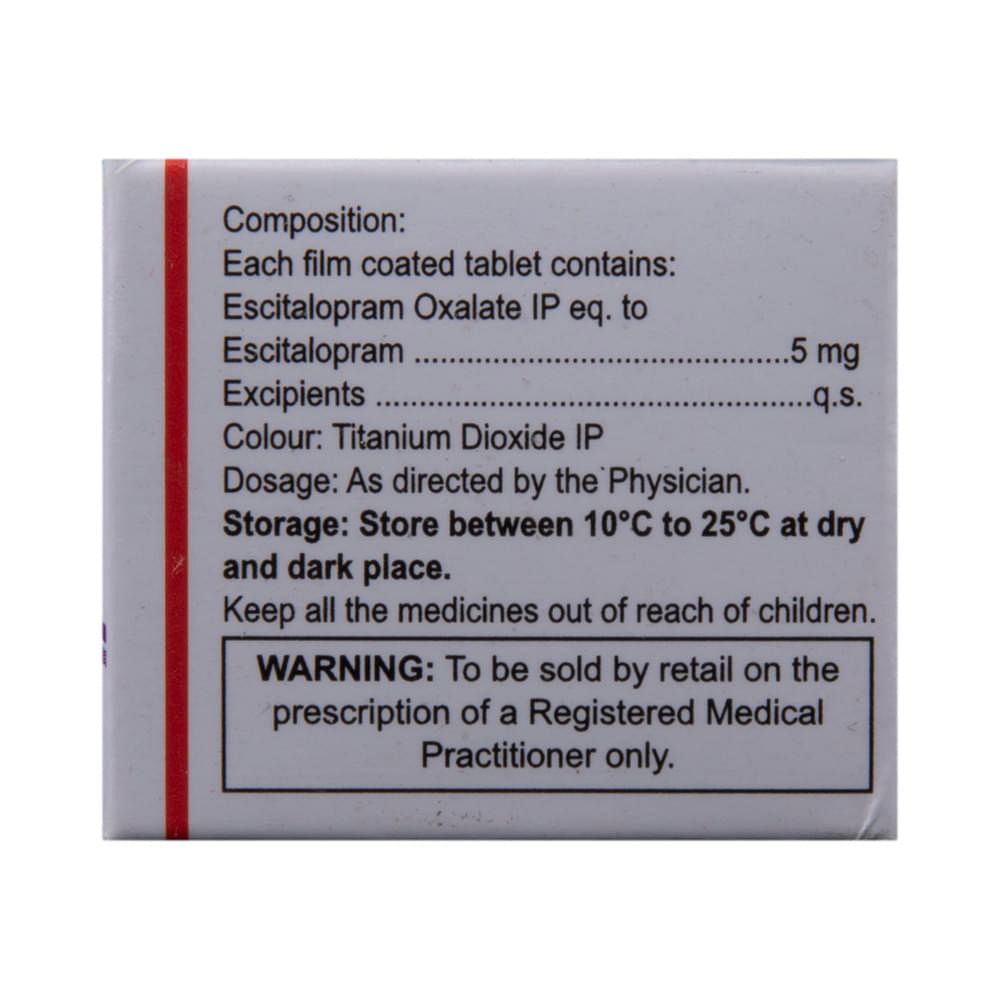
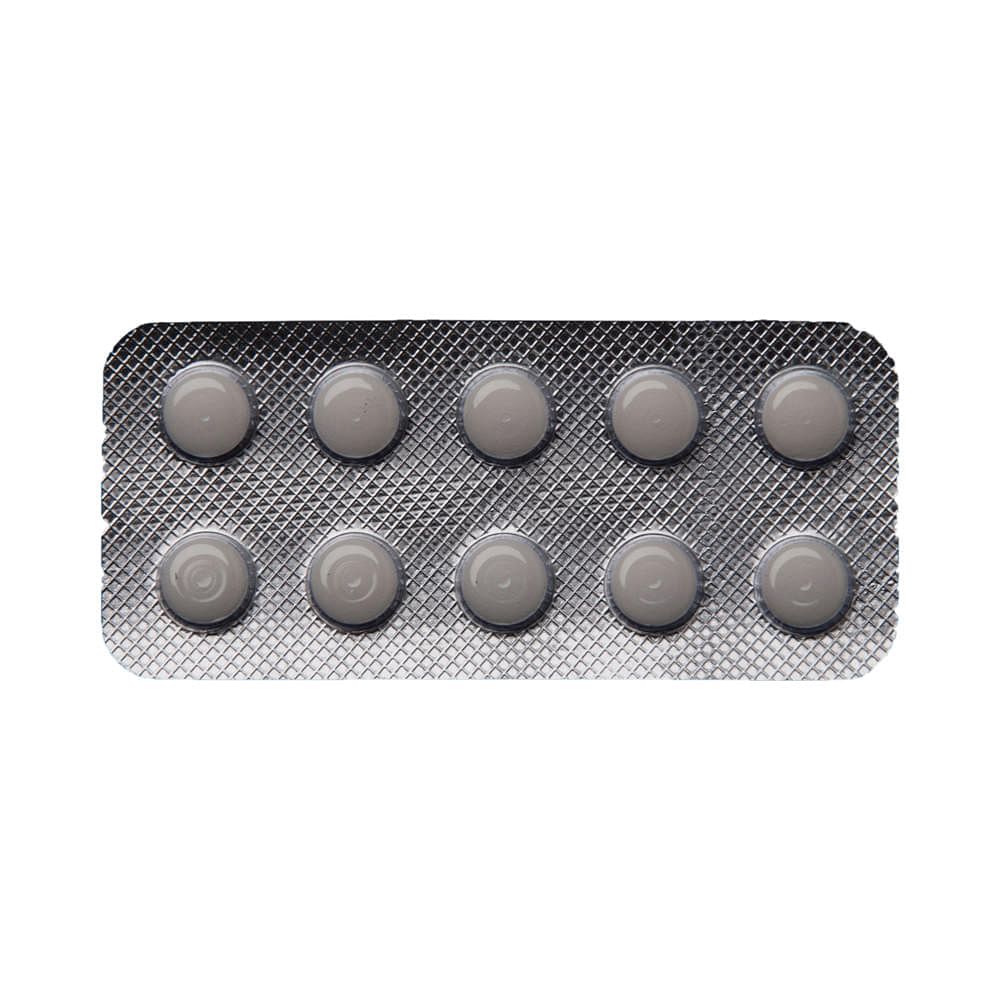
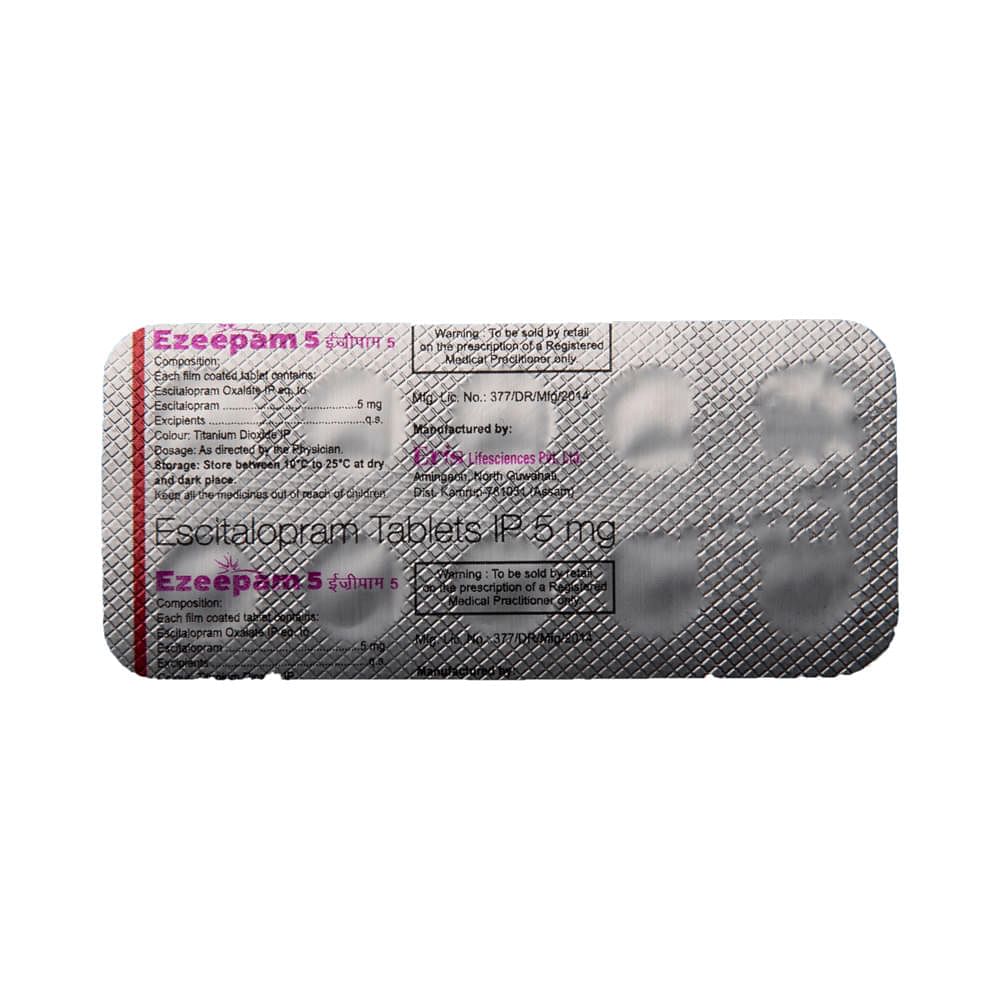

Ezeepam 5 Tablet
Manufacturer
Eris Lifesciences Ltd
Salt Composition
Escitalopram Oxalate (5mg)
Key Information
Short Description
Ezeepam 5 Tablet is a selective serotonin reuptake inhibitor (SSRI) antidepressant used to treat depression, anxiety, panic disorder, and obsessive-compulsive disorder.
Dosage Form
Tablet
Introduction
Ezeepam 5 Tablet helps recover from depression by improving mood and relieving anxiety and tension. It can be taken with or without food. The dose and how often you need it will be decided by your doctor based on the amount needed to control your symptoms. Your doctor may start you on a lower dose and increase it gradually. Do not change the dose or stop taking it without talking to your doctor even if you feel well. Doing so may make your condition worse or you may suffer from unpleasant withdrawal symptoms such as anxiety, restlessness, palpitations, dizziness, and sleep disturbances.
Directions for Use
Take this medicine in the dose and duration as advised by your doctor. Swallow it as a whole. Do not chew, crush, or break it. Ezeepam 5 Tablet may be taken with or without food but it is better to take it at a fixed time.
Safety Information
Side Effects
Some common side effects of this medicine include nausea, fatigue, increased sweating, insomnia (difficulty in sleeping), decreased sexual drive, delayed ejaculation, and women may experience difficulties achieving orgasm.
Alcohol Warning
It is unsafe to consume alcohol with Ezeepam 5 Tablet.
Breastfeeding Warning
Ezeepam 5 Tablet is probably unsafe to use during breastfeeding. Limited human data suggests that the drug may pass into the breastmilk and harm the baby.
Pregnancy Warning
Ezeepam 5 Tablet may be unsafe to use during pregnancy. Although there are limited studies in humans, animal studies have shown harmful effects on the developing baby. Your doctor will weigh the benefits and any potential risks before prescribing it to you. Please consult your doctor.
Interacting Medicines
Linezolid Moclobemide Rasagiline Reboxetine
How it works
Ezeepam 5 Tablet is a selective serotonin reuptake inhibitor (SSRI) antidepressant. It works by increasing the levels of serotonin a chemical messenger in the brain. This improves mood and physical symptoms of depression and also relieves symptoms of anxiety, panic attacks, and obsessive-compulsive disorders.
Quick Tips
Take it in the morning since it can keep you awake if taken late at night. Talk to your doctor if you notice sudden mood changes or develop suicidal thoughts. It has a lower chance of causing sexual dysfunction than other similar medications. The addiction or dependence potential of Ezeepam 5 Tablet is very less. Do not stop taking the medication suddenly without talking to your doctor first. Some people can develop dizziness or drowsiness after taking this medicine. Do not drive or do anything that requires mental focus until you know how this medicine affects you
Frequently asked questions
How long does it take for Ezeepam 5 Tablet to work?
The time it takes for Ezeepam 5 Tablet to show effectiveness varies between individuals. Typically, some improvement may be noticed within 2-4 weeks, but full benefits might require a longer period. It is crucial to continue taking the medication as prescribed and consult your doctor if you experience no improvement or worsen after starting the treatment.
What are the most common side effects of Ezeepam 5 Tablet?
The most frequently reported side effects of Ezeepam 5 Tablet include headache and nausea. Other commonly encountered side effects involve nasal congestion, changes in appetite (decreased or increased), anxiety, restlessness, abnormal dreams. Additionally, you may experience drowsiness, difficulty falling asleep, dizziness, yawning, tremors, diarrhea, constipation, and vomiting. Other potential side effects might involve dry mouth, sweating increase, fatigue, fever, weight gain, muscle and joint pain, delayed ejaculation, erectile dysfunction, decreased libido in men, and difficulties achieving orgasm in women.
What is Ezeepam 5 Tablet used for?
Ezeepam 5 Tablet is prescribed to manage depression and anxiety disorders such as social phobia, generalized anxiety disorder, panic attacks, and obsessive-compulsive disorder (OCD).
Is Ezeepam 5 Tablet dangerous?
The use of Ezeepam 5 Tablet in children, adolescents, and young adults may pose a heightened risk of suicidal thoughts. It's crucial to discuss the potential risks and benefits with your doctor before starting this medication. Notably, it is not recommended for children under 12 years of age.
Is Ezeepam 5 Tablet better taken at night or in the morning?
It's generally advisable to take Ezeepam 5 Tablet once daily in the morning, as it can potentially keep you awake if taken later in the day. It can be taken with or without food. However, taking it at the same time each day is recommended for easier dosage management.
Can I stop taking Ezeepam 5 Tablet on my own?
Abruptly discontinuing Ezeepam 5 Tablet can lead to withdrawal symptoms. While these are often mild and subside within two weeks, it's not recommended to stop treatment without consulting your doctor. It is essential to discuss potential dosage adjustments with your healthcare provider for a safe transition.
What are the withdrawal symptoms one may experience?
Withdrawal symptoms from stopping Ezeepam 5 Tablet might include dizziness, sleep disturbances such as vivid dreams, nightmares, and difficulty sleeping. Other potential symptoms involve anxiety, headaches, burning sensations and electric shock sensations. You may also experience nausea, sweating (including night sweats), restlessness or agitation, tremors, confusion, irritability, diarrhea, visual disturbances, and palpitations.
What if I accidentally take more than the recommended dose of Ezeepam 5 Tablet?
If you accidentally exceed the prescribed dosage of Ezeepam 5 Tablet, seek immediate medical attention at a nearby hospital or contact your doctor. You may experience symptoms such as dizziness, tremors, agitation, convulsions, nausea, and vomiting. Other potential complications include changes in heart rhythm, decreased blood pressure, and disruption in fluid/salt balance.


